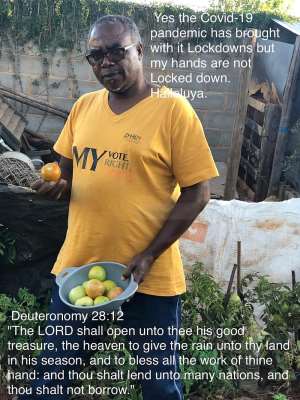
The closure of borders affected the export of produce to neighbouring countries. At local level consumption was also affected as most of the restaurants, hotels, and food outlets were closed, especially tourist hotels and other conference halls. Whereas these provide huge market to farmers daily.
Some farmers could not harvest their farm produce owing to the fact that lockdowns were unpredictable, consequently changing timeframe, and plans.
Projection in production meant for export has also been affected by the lockdowns. This propelled the horticulture industry, perishable products like vegetables and flowers to hike prices due to shortage of supply amid poor market opportunities.
A large number of businesses were on life support and most of them were forced to close. Farmers also find it difficult to transport products to the markets.
To farmers in poultry production, the lockdowns meant loss to them. Sharing her experience Priscilla Maki, who is in animal production in Soweto, South Africa, one of the most hard-hit countries in Africa said, "Restrictions in accessing the central business district (CBD) to get feeds, vaccines and drugs for poultry made me lose my birds and there was an unnecessary increase of cost of production."
Responding to the question on implications of the Covid-19 pandemic Mr Edison Tendekayi Sabeta, a smallholder farmer based in Bulawayo said,
"The pandemic has thrown people out of sync with their normal routines. In all sectors, the Covid-19 pandemic has brought confusion. Most productivity is achieved where there is organised human resources". He says social distancing is another hindrance to production.
Quoting the bible in Romans 8:28, "All things work together for the good".
Others have been disadvantaged while others have been awakened. Those who have previously done little or no serious backyard farming, have suddenly been galvanized into action by the Lockdowns that came because of the pandemic. Not accessing their normal supply of essential products like vegetables, they started growing for themselves.
Mr. Sabeta is of the view that backyard farms that have sprouted shall give rise to an appetite for real farming which will translate to better land utilisation in communities and make the world food secure in the next 5 years.
All these considerations are still at the mercy of the climatic conditions.
Mr. Sabeta encouraged farmers not to watch the clouds, lest they wont plant. He goes on to say, "farmers need to adopt new tactics. If seed houses have been disturbed let the farmer plant from his last season's harvest."
To minimise the impact of food insecurity arising from the pandemic governments should introduce prediction models which are necessary to project the impact on national economies particularly of import commodities.
Lack of essential data collection is a major gap for regulators to come up with viable policies, and measures to reduce the impacts of the pandemic.
For instance, food prices need to be continuously collected, monitored, and shared to Policy regulators or Ministries responsible Agriculture, Trade and commerce.





 Elisu By-election: "If you call yourself a man, boo Chairman Wontumi again" — Bo...
Elisu By-election: "If you call yourself a man, boo Chairman Wontumi again" — Bo...
 Fuel tanker driver escapes with his life after tanker goes up in flames near Suh...
Fuel tanker driver escapes with his life after tanker goes up in flames near Suh...
 Uniform change: ‘Blue and white are brighter colours’ — Kwasi Kwarteng explains ...
Uniform change: ‘Blue and white are brighter colours’ — Kwasi Kwarteng explains ...
 MoE not changing all public basic school uniforms but only newly built ones — Kw...
MoE not changing all public basic school uniforms but only newly built ones — Kw...
 We’re only painting new public basic schools blue and white – Dr. Adutwum clarif...
We’re only painting new public basic schools blue and white – Dr. Adutwum clarif...
 Bawumia has lost confidence in his own govt’s economic credentials – Beatrice An...
Bawumia has lost confidence in his own govt’s economic credentials – Beatrice An...
 I fought WW2 at age 16 – WO1 Hammond shares At Memoir Launch
I fought WW2 at age 16 – WO1 Hammond shares At Memoir Launch
 GRA-SML deal: Regardless of what benefits have been accrued, the contract was aw...
GRA-SML deal: Regardless of what benefits have been accrued, the contract was aw...
 April 26: Cedi sells at GHS13.75 to $1, GHS13.18 on BoG interbank
April 26: Cedi sells at GHS13.75 to $1, GHS13.18 on BoG interbank
 Champion, promote the interest of women if you become Vice President – Prof. Gya...
Champion, promote the interest of women if you become Vice President – Prof. Gya...
